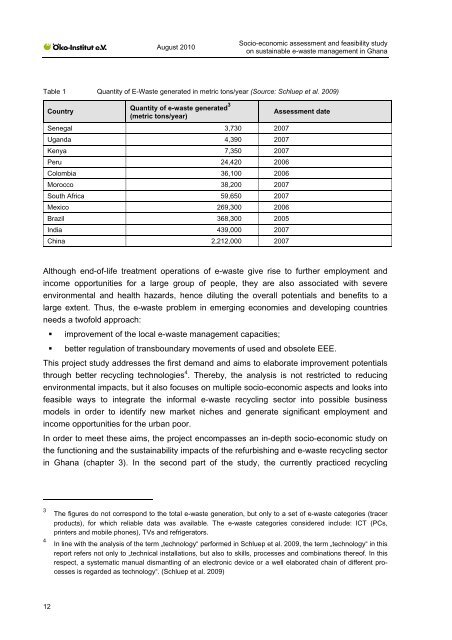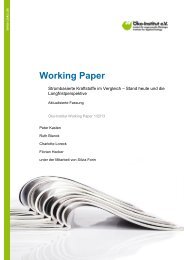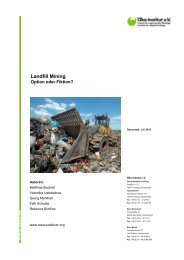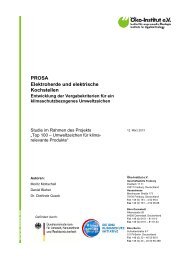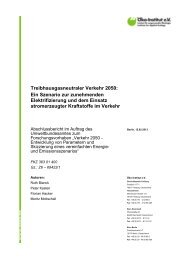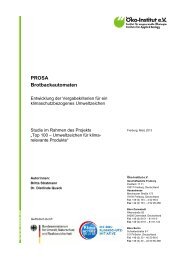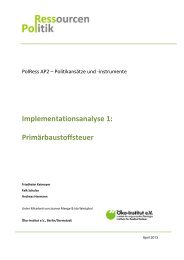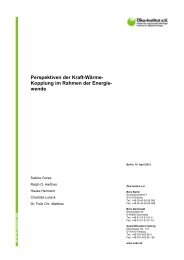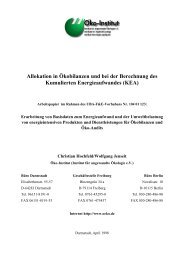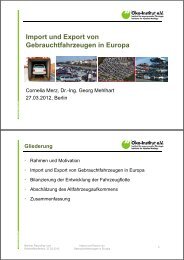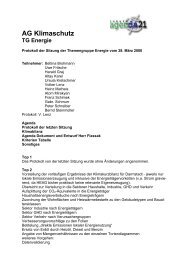Socio-economic assessment and feasibility study on - Öko-Institut eV
Socio-economic assessment and feasibility study on - Öko-Institut eV
Socio-economic assessment and feasibility study on - Öko-Institut eV
Create successful ePaper yourself
Turn your PDF publications into a flip-book with our unique Google optimized e-Paper software.
12<br />
August 2010<br />
<str<strong>on</strong>g>Socio</str<strong>on</strong>g>-<str<strong>on</strong>g>ec<strong>on</strong>omic</str<strong>on</strong>g> <str<strong>on</strong>g>assessment</str<strong>on</strong>g> <str<strong>on</strong>g>and</str<strong>on</strong>g> <str<strong>on</strong>g>feasibility</str<strong>on</strong>g> <str<strong>on</strong>g>study</str<strong>on</strong>g><br />
<strong>on</strong> sustainable e-waste management in Ghana<br />
Table 1 Quantity of E-Waste generated in metric t<strong>on</strong>s/year (Source: Schluep et al. 2009)<br />
Country<br />
Quantity of e-waste generated 3<br />
(metric t<strong>on</strong>s/year)<br />
Senegal 3,730 2007<br />
Ug<str<strong>on</strong>g>and</str<strong>on</strong>g>a 4,390 2007<br />
Kenya 7,350 2007<br />
Peru 24,420 2006<br />
Colombia 36,100 2006<br />
Morocco 38,200 2007<br />
South Africa 59,650 2007<br />
Mexico 269,300 2006<br />
Brazil 368,300 2005<br />
India 439,000 2007<br />
China 2,212,000 2007<br />
Assessment date<br />
Although end-of-life treatment operati<strong>on</strong>s of e-waste give rise to further employment <str<strong>on</strong>g>and</str<strong>on</strong>g><br />
income opportunities for a large group of people, they are also associated with severe<br />
envir<strong>on</strong>mental <str<strong>on</strong>g>and</str<strong>on</strong>g> health hazards, hence diluting the overall potentials <str<strong>on</strong>g>and</str<strong>on</strong>g> benefits to a<br />
large extent. Thus, the e-waste problem in emerging ec<strong>on</strong>omies <str<strong>on</strong>g>and</str<strong>on</strong>g> developing countries<br />
needs a twofold approach:<br />
� improvement of the local e-waste management capacities;<br />
� better regulati<strong>on</strong> of transboundary movements of used <str<strong>on</strong>g>and</str<strong>on</strong>g> obsolete EEE.<br />
This project <str<strong>on</strong>g>study</str<strong>on</strong>g> addresses the first dem<str<strong>on</strong>g>and</str<strong>on</strong>g> <str<strong>on</strong>g>and</str<strong>on</strong>g> aims to elaborate improvement potentials<br />
through better recycling technologies 4 . Thereby, the analysis is not restricted to reducing<br />
envir<strong>on</strong>mental impacts, but it also focuses <strong>on</strong> multiple socio-<str<strong>on</strong>g>ec<strong>on</strong>omic</str<strong>on</strong>g> aspects <str<strong>on</strong>g>and</str<strong>on</strong>g> looks into<br />
feasible ways to integrate the informal e-waste recycling sector into possible business<br />
models in order to identify new market niches <str<strong>on</strong>g>and</str<strong>on</strong>g> generate significant employment <str<strong>on</strong>g>and</str<strong>on</strong>g><br />
income opportunities for the urban poor.<br />
In order to meet these aims, the project encompasses an in-depth socio-<str<strong>on</strong>g>ec<strong>on</strong>omic</str<strong>on</strong>g> <str<strong>on</strong>g>study</str<strong>on</strong>g> <strong>on</strong><br />
the functi<strong>on</strong>ing <str<strong>on</strong>g>and</str<strong>on</strong>g> the sustainability impacts of the refurbishing <str<strong>on</strong>g>and</str<strong>on</strong>g> e-waste recycling sector<br />
in Ghana (chapter 3). In the sec<strong>on</strong>d part of the <str<strong>on</strong>g>study</str<strong>on</strong>g>, the currently practiced recycling<br />
3 The figures do not corresp<strong>on</strong>d to the total e-waste generati<strong>on</strong>, but <strong>on</strong>ly to a set of e-waste categories (tracer<br />
products), for which reliable data was available. The e-waste categories c<strong>on</strong>sidered include: ICT (PCs,<br />
printers <str<strong>on</strong>g>and</str<strong>on</strong>g> mobile ph<strong>on</strong>es), TVs <str<strong>on</strong>g>and</str<strong>on</strong>g> refrigerators.<br />
4 In line with the analysis of the term „technology“ performed in Schluep et al. 2009, the term „technology“ in this<br />
report refers not <strong>on</strong>ly to „technical installati<strong>on</strong>s, but also to skills, processes <str<strong>on</strong>g>and</str<strong>on</strong>g> combinati<strong>on</strong>s thereof. In this<br />
respect, a systematic manual dismantling of an electr<strong>on</strong>ic device or a well elaborated chain of different processes<br />
is regarded as technology“. (Schluep et al. 2009)


